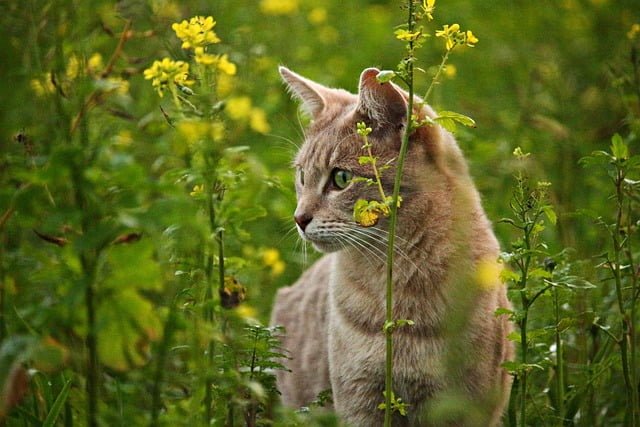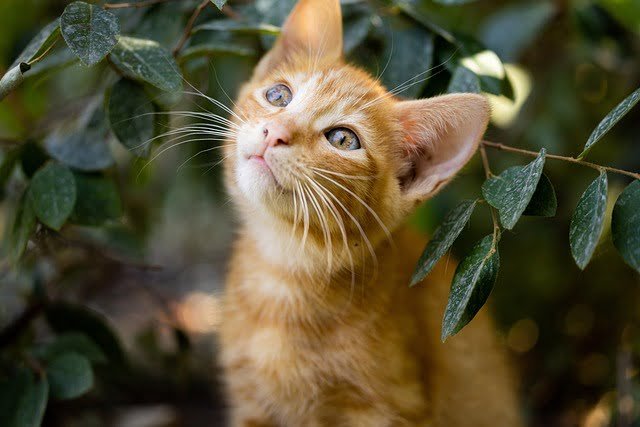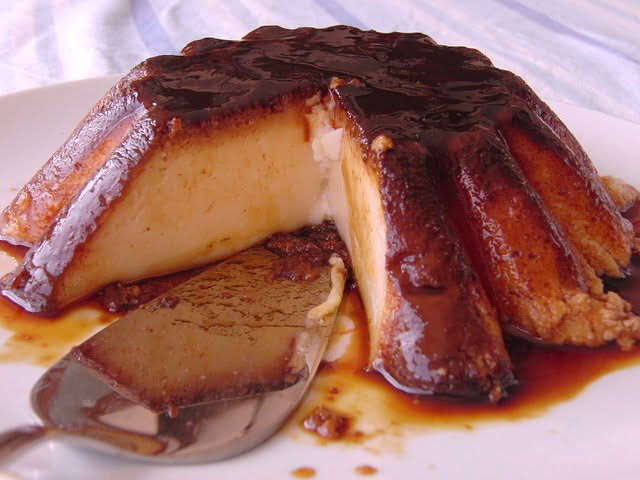Cats are known for being curious creatures when it comes to food. They often try to sneak a bite of whatever their owners are eating, whether it’s safe for them or not. As cat owners, it’s important to know what foods are safe for our feline friends to eat. One dessert that may come to mind is flan. But can cats eat flan?
Flan is a sweet dessert that originated in Spain and is made with eggs, milk, sugar, and caramel. While it may be tempting to share a bite with your furry friend, it’s important to note that flan is not a suitable food for cats. The high sugar content and dairy ingredients can cause digestive issues and even lead to obesity and other health problems. As responsible pet owners, it’s crucial to stick to a balanced and nutritious diet for our cats to ensure their well-being.

What Is Flan?
Flan is a dessert that originated in Spain and is now popular in many countries around the world. It is a custard-like dessert that is typically made with eggs, milk, sugar, and vanilla. The mixture is poured into a dish and baked until it sets. Once it cools, it is usually served with caramel sauce.
Flan can come in many different variations, including chocolate, coconut, and fruit-flavored. It can also be made with different types of milk, such as evaporated milk or condensed milk.
In some countries, flan is also known as crème caramel or caramel custard. It is a popular dessert in many Latin American countries and is often served during special occasions such as birthdays and holidays.
While flan is generally considered a sweet dessert, there are some savory versions that can be made with ingredients like cheese or vegetables. These types of flans are often served as a side dish or appetizer.
Overall, flan is a delicious and versatile dessert that can be enjoyed in many different ways. However, it is important to note that not all ingredients are safe for cats to consume, so it is always best to check with a veterinarian before giving any human food to your furry friend.
Understanding Cat’s Dietary Needs
As responsible cat owners, it is important for us to understand the dietary needs of our feline friends. Cats are obligate carnivores, which means they require a diet that consists mainly of animal protein. Unlike humans, cats cannot produce certain essential nutrients on their own and must obtain them from their diet.
Protein is the most important nutrient in a cat’s diet, as it helps maintain healthy muscles, skin, and fur. In addition, cats require certain amino acids, such as taurine and arginine, which are only found in animal protein. Without these amino acids, cats can develop serious health problems, including heart disease and blindness.
In addition to protein, cats also require fat in their diet. Fat provides energy and helps maintain healthy skin and fur. However, it is important to note that cats require a specific balance of omega-3 and omega-6 fatty acids. Too much of one or the other can lead to health problems.
Carbohydrates are not a necessary component of a cat’s diet, as they can obtain energy from protein and fat. However, some commercial cat foods contain carbohydrates as a filler. It is important to choose a high-quality cat food that meets your cat’s nutritional needs.
In summary, cats require a diet that is high in animal protein, moderate in fat, and low in carbohydrates. As responsible cat owners, it is our duty to provide our feline friends with a balanced and nutritious diet to ensure their overall health and well-being.
Potential Risks of Flan for Cats
While cats are carnivorous animals, they may occasionally show interest in human food. However, not all human foods are safe for cats to consume. Flan, a popular dessert made with sugar, dairy, and eggs, is one such food that may pose some risks to your feline friend.
Sugar Content
Flan is high in sugar, which can be harmful to cats. Consuming too much sugar can lead to obesity, dental problems, and even diabetes in cats. Additionally, cats lack the enzymes necessary to break down and digest large amounts of sugar, which can cause gastrointestinal distress.
Dairy Ingredients
Most cats are lactose intolerant, which means they lack the enzyme lactase necessary to digest lactose, a sugar found in milk and dairy products. Flan contains milk, cream, and condensed milk, which are all dairy products. Feeding your cat flan can cause digestive issues such as diarrhea, vomiting, and abdominal pain.
Artificial Additives
Flan may contain artificial additives such as food colorings, flavorings, and preservatives. These additives can be harmful to cats and may cause adverse reactions such as allergic reactions, gastrointestinal upset, and even organ damage.
In conclusion, while cats may show interest in human food, it is important to be cautious about what you feed them. Flan is a dessert that may pose some risks to your cat’s health due to its high sugar content, dairy ingredients, and artificial additives. It is best to stick to a balanced and nutritionally complete diet formulated specifically for cats.

Possible Benefits of Flan for Cats
As cat owners, we always want to make sure that our feline friends are getting the best nutrition possible. While cats are obligate carnivores and require a diet high in animal protein, they can benefit from a small amount of other foods in their diet, including certain fruits and vegetables.
One such food is flan, a dessert made of custard and caramel. Flan is a good source of calcium, which is essential for maintaining strong bones and teeth in cats. It also contains small amounts of vitamins A and D, which are important for healthy vision and skin.
In addition, flan is a good source of hydration for cats. The custard and caramel in flan are made with milk and sugar, both of which can help keep cats hydrated. This is especially important for cats who are prone to urinary tract issues, as adequate hydration can help prevent these problems.
However, it’s important to note that flan should only be given to cats in moderation and as a treat, rather than as a regular part of their diet. Too much sugar and dairy can cause digestive upset and contribute to obesity and other health problems in cats.
Overall, while flan should not be a staple in a cat’s diet, it can provide some nutritional benefits and be a tasty treat for our feline friends.
Alternative Treats for Cats
While cats may enjoy the occasional taste of human food, it’s important to remember that not all human foods are safe for cats to consume. Flan, for example, is not a suitable treat for cats due to its high sugar content and potential to cause digestive issues.
Luckily, there are many alternative treats that cats can enjoy without risking their health. Here are a few options to consider:
- Catnip: Many cats love the scent and taste of catnip, which can be found in both fresh and dried forms. Catnip is safe for cats to consume and can provide a fun and stimulating treat.
- Freeze-dried meat: Many pet stores sell freeze-dried meat treats that are made specifically for cats. These treats are high in protein and low in carbohydrates, making them a healthy and satisfying snack.
- Canned pumpkin: Canned pumpkin is a great treat for cats, as it is high in fiber and can help regulate their digestive system. Be sure to choose plain pumpkin puree without any added sugars or spices.
- Cooked chicken or fish: Plain, cooked chicken or fish can be a tasty and healthy treat for cats. Just be sure to remove any bones and avoid seasoning the meat with spices or herbs.
Remember, treats should only make up a small portion of your cat’s diet. Always consult with your veterinarian before introducing new foods to your cat’s diet, and monitor their behavior and digestive system for any signs of discomfort or illness.
When to Consult a Veterinarian
If you notice any unusual behavior or symptoms in your cat after eating flan, it is important to consult a veterinarian. Some cats may have an allergic reaction to certain ingredients in flan, which can result in symptoms such as vomiting, diarrhea, and difficulty breathing. In severe cases, an allergic reaction can be life-threatening.
Additionally, flan is a high-calorie dessert that can lead to obesity and other health problems if consumed in excess. If your cat has a history of obesity or other health issues, it is important to monitor their diet and consult with a veterinarian before introducing new foods, including flan.
If your cat has eaten a large amount of flan or is showing signs of distress after consuming it, it is important to seek veterinary care immediately. Your veterinarian can assess your cat’s condition and provide appropriate treatment, which may include medication to alleviate symptoms or even hospitalization in severe cases.
Overall, while it may be tempting to share your flan with your feline friend, it is important to be cautious and monitor their reaction. If you have any concerns about your cat’s health, always consult with a veterinarian for guidance.

Frequently Asked Questions
Is flan safe for cats to eat?
No, flan is not safe for cats to eat. It contains ingredients that are harmful to cats, such as sugar, milk, and eggs. These ingredients can cause digestive issues, obesity, and other health problems in cats.
Are there any harmful ingredients in flan for cats?
Yes, there are several harmful ingredients in flan for cats. Sugar, milk, and eggs can cause digestive problems, obesity, and other health issues in cats. Additionally, flan may contain other ingredients such as vanilla extract or caramel that can be harmful to cats.
Can cats digest flan properly?
No, cats cannot digest flan properly. The ingredients in flan can cause digestive issues, such as diarrhea, vomiting, and bloating. These issues can lead to more serious health problems if left untreated.
What are some potential risks of feeding flan to cats?
Feeding flan to cats can lead to several potential risks, including digestive problems, obesity, and other health issues. Additionally, some cats may have an allergic reaction to the ingredients in flan, which can be life-threatening.
Are there any alternatives to flan that are safe for cats to eat?
Yes, there are several alternatives to flan that are safe for cats to eat. Some examples include cooked chicken, fish, or turkey, as well as small amounts of plain yogurt or cottage cheese.
What should I do if my cat accidentally eats flan?
If your cat accidentally eats flan, monitor them closely for any signs of digestive issues or other health problems. Contact your veterinarian immediately if you notice any changes in your cat’s behavior or health.





